Share
Working at ESO
Are you interested in working in areas of frontline technology and in a stimulating international environment? Do you feel your profile matches our requirements? Learn more about our current vacancies and apply online. Read more..
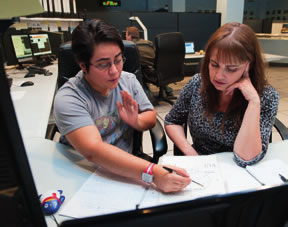
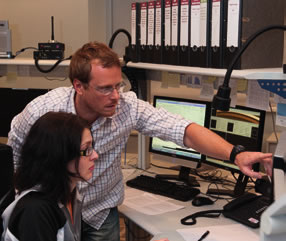

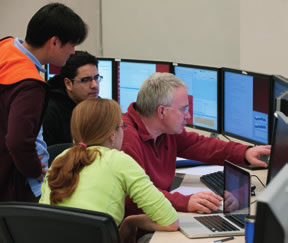
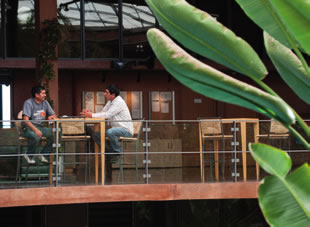

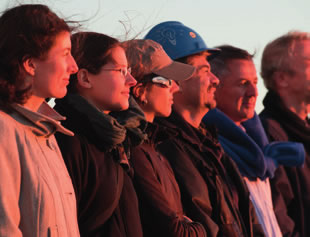
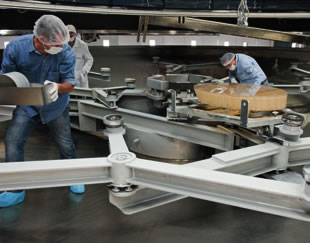
The European Organisation for Astronomical Research in the Southern Hemisphere (ESO) is the foremost intergovernmental astronomy organisation in Europe and the world's most productive ground-based astronomical observatory. ESO carries out an ambitious programme focused on the design, construction and operation of powerful ground-based observing facilities enabling astronomers to make important scientific discoveries.
ESO operates three unique world-class observing sites in northern Chile: La Silla, Paranal and Chajnantor (home to ALMA and APEX), and the ESO Headquarters are located in Garching, near Munich, Germany.
At Paranal, ESO operates the Very Large Telescope, the world's most advanced visible-light astronomical observatory. ESO is a major partner in ALMA, the largest astronomical project in existence. And on Cerro Armazones, ESO is building the 39-metre Extremely Large Telescope, which will become "the world's biggest eye on the sky" and whose operations will be fully integrated into the Paranal Observatory.
For its ESO ALMA Support Centre (EASC) at the Headquarters in Garching near Munich, Germany, ESO is seeking an
ALMA Instrument Scientist
Garching
Deadline 31/08/2017
The ALMA Instrument Scientist will be an active radio astronomer, primarily responsible for supporting the extension of the scientific/technical capabilities of ALMA through optimization of current capabilities, research and development studies and upgrade projects. Upgrades vary considerably in scope and could include antenna performance improvements, new receivers, enhancements to digital electronics, new software for control or data reduction or novel calibration methods. They are typically developed by external institutes, consortia or industrial contractors. The ALMA Instrument Scientist will work as a member of the ESO ALMA Support Centre Science Team to interface with these groups as well as with ESO engineers. The ALMA Instrument Scientist will play a key role in the definition and execution of the ALMA Development Plan, working closely with other ESO staff, astronomers and engineers in the ESO community and the ALMA Partnership to maximise the scientific effectiveness of the Observatory.
Main Duties and Responsibilities:
As part of the EASC Science Team, the ALMA Instrument Scientist will contribute in the following areas.
- Draft system specifications for ALMA Development over the next 5-15 years, in close collaboration with ESO astronomers and engineers, the ESO community and the other members of the ALMA Partnership.
- Issue and own the scientific and technical specifications for specific ALMA upgrades, by agreement with the ESO and ALMA teams.
- Work with the Programme Scientist to assess priorities for ALMA development (studies and projects) in Europe and make recommendations to ESO advisory committees and senior management.
- Work closely with EASC engineers and management to promote and support in-house ALMA technology development.
- Provide scientific input throughout the course of specific ALMA upgrade projects by participation in design reviews and close interaction with the responsible institutes or contractors.
- Develop or monitor calibration and data reduction plans as appropriate.
- Develop the commissioning plans (where applicable).
- In collaboration with the ALMA Regional Centre and Joint ALMA Observatory, ensure commissioning, science verification and hand-over to the observatory of the upgrade.
- Follow up the scientific use of the upgrade and propose future upgrade paths if appropriate.
- With the ESO ALMA Programme Scientist, coordinate interactions with the ESO and ALMA scientific advisory bodies and the astronomical community at large, particularly EU organisations such as RadioNet.
- Develop personal scientific research in observational (sub)millimetre interferometry, and contribute to the overall scientific environment at ESO.
As a member of the ESO Science Faculty, the ALMA Instrument Scientist is expected and encouraged to conduct an active astronomical research programme.
Reports to:
Head of ESO ALMA Support Centre
Experience:
- Proven track record in and observational experience with radio interferometry, preferably at mm/sub-mm wavelengths.
- Ability to contribute to calibration and commissioning of hardware and/or software components of a radio/mm interferometer: previous experience in this area would be very desirable.
- A deep understanding of the science drivers for mm/sub-mm telescopes and instruments and methods for evaluation of their performance.
- A good conceptual understanding of the system design and operation of mm/sub-mm arrays.
- Skills and interests in some of the technical areas relevant to ALMA, for example: atmospheric effects, antennas, receivers, digital electronics, control and data-reduction software, calibration and imaging.
- An active research programme, demonstrating the planning, execution, analysis, and publication of radio/mm/sub-mm observations or instrumentation development.
Key Competences:
- Excellent domain knowledge;
- Good problem-solving ability, including quantitative analysis;
- Excellent writing, presentation and communication skills;
- Ability to communicate effectively across disciplines at all levels within the organisation and with the ESO and ALMA communities, recognising cultural differences within an international partnership;
- Strong influencing skills, including the ability to motivate and inspire others without explicit line management responsibility.
Qualifications:
Ph.D. in astronomy, physics or equivalent.
Language Skills:
The position requires an excellent knowledge of English.
Remuneration and Contract:
We offer an attractive remuneration package including a competitive salary (tax free), comprehensive pension scheme and medical, educational and other social benefits, as well as financial help in relocating your family and the possibility to place your child/children in daycare.
The contract is for a fixed term duration of three years, and is subject to successful completion of the probation period. There is a possibility of extension(s) subject to individual performance and organisational requirements, and as defined in the applicable policies and staff rules and regulations. For any further information, please visit http://www.eso.org/public/jobs/conditions/intstaff.
Duty Station:
Garching near Munich, Germany with duty trips to the ALMA sites in Chile and to institutes in the ALMA partner countries.
Career Path: V
Application:
If you are interested in working in areas of frontline technology and in a stimulating international environment, please visit http://www.eso.org/ and http://www.almaobservatory.org/ for further details.
Applicants are invited to apply online at http://jobs.eso.org/. Applications must be completed in English and should include a motivation letter, CV containing a publication list with a research statement. Also required are the names and contact details of three scientists familiar with your work and willing to provide a recommendation letter. Referees will be automatically invited to submit a recommendation letter. However, applicants are strongly advised to trigger these invitations (using the web application form) well in advance of the application deadline.
Closing date for applications is 31.08.2017.
Interviews are expected to start soon after this date.
No nationality is in principle excluded. However, recruitment preference will be given to nationals of Australia, Austria, Belgium, Brazil, the Czech Republic, Denmark, Finland, France, Germany, Italy, the Netherlands, Poland, Portugal, Spain, Sweden, Switzerland and United Kingdom.
The post is equally open to suitably qualified female and male applicants.
